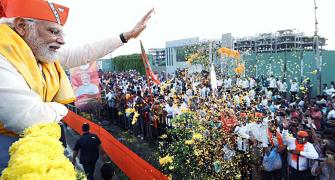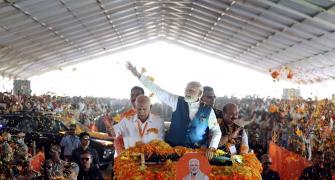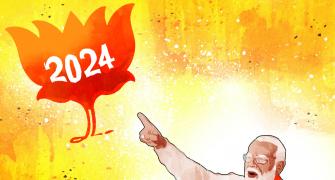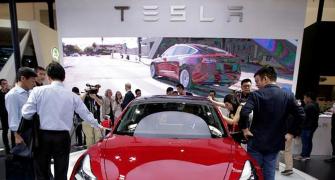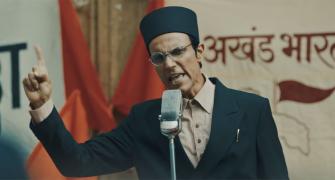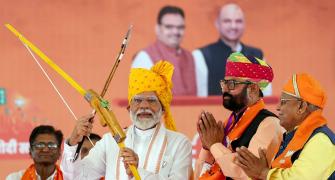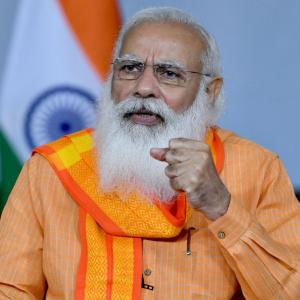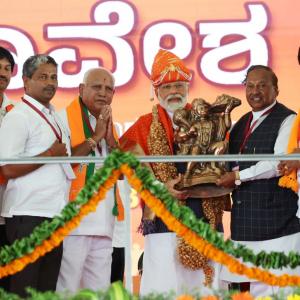The BJP's challenge is whether it can again deflate a Congress, which now looks reinvigorated and has adopted sharper messaging around its 'guarantees', and several regional parties, especially in Bihar, Maharashtra and West Bengal.

The Narendra Modi government marks its ninth anniversary a few days ago, acutely aware that 10 months from now, it will face a united Opposition that will try to convince the electorate that the PM reneged on his promise of delivering 'acche din', or better days.
The challenges confronting Modi and his party are similar to 2019, which they won within five months of losing three key Hindi heartland states.
"The 2004 'India Shining' electoral disaster taught the BJP's current crop of leadership to be ideologically agile, evident in the February 2019 vote on accounts and even now," a senior BJP leader, currently in charge of a poll-bound state, said in a conversation.
In April, the Centre formed a committee to study whether the new pension scheme warranted any changes after losing the Himachal Pradesh assembly polls in December 2022.
A central plank of the Congress was restoring the 'old pension scheme'.
In February 2019, less than two months after the BJP lost the Chhattisgarh, Madhya Pradesh and Rajasthan assembly polls to the Congress over agrarian distress, Union Minister Piyush Goyal stood up in the Lok Sabha to present an Interim Budget.
Goyal stretched the norm that an elected government should only table five full Budgets.
He announced key decisions, including the PM Kisan Nidhi scheme, a Rs 6,000 annual allowance as a palliative to small farmers, and an income tax break for the middle class.
Modi's charisma, the government's outreach to the farmers and middle class through the interim Budget and the nationalistic fervour in the wake of the Pulwama-Balakot episode made Modi the first PM since 1971 to return to power with a majority.
The BJP has shown political fleet-footedness throughout its nine years in power at the Centre.
Modi withdrew the land bill in 2015 after criticism that his was a 'suit boot ki sarkar' and embraced 'garib kalyan', the welfare of the poor, as the leitmotif of his government.
By May 2016, he launched the Ujjwala Yojana in Uttar Pradesh, where the polls were due a year later and pursued building toilets.
When Rahul Gandhi promised a farm loan waiver to UP's farmers, the BJP shed its aversion to the idea, promising and delivering it within weeks of Yogi Adityanath's oath.
November 8, 2016, demonetisation came precisely three months before the first phase of polling in UP, with people convinced that it hurt the wealthy, contributing to the perception that Modi has delivered on his commitment to weed out corruption.
The Modi government made its own some of the schemes it inherited from the UPA, such as the Jan Dhan Yojana, the Aadhaar-based direct benefit transfer and housing scheme, amending the goods and services tax regulations frequently in the run-up to the December 2017 Gujarat assembly polls after businesses complained.
The BJP achieved its core agenda of repealing Article 370 and constructing a Ram temple in Ayodhya within months of its 2019 victory, resorted to astute social engineering and also crafted a 'labharthi', a beneficiary class, which helped it overcome setbacks like protests over the anti-Citizenship (Amendment) Act and farm laws to win UP again in March 2022.
The new Parliament building, the launch of the Gaganyaan, India hosting the G20 summit in September and the inauguration of the Ram temple in January should add to the PM's charisma.
However, the BJP looked tired, despite the PM's popularity, in the Karnataka assembly polls.
The marginalised and the poor, which have taken to vote for the BJP in northern India, shifted to the Congress, as did women in Karnataka.
As the debate over 'revari', or freebies, and its Karnataka loss, show, the BJP is trying to come up with new ideas that might help Modi match the record of Jawaharlal Nehru -- leading his party to win in three successive general elections.
The BJP's challenge is whether it can again deflate a Congress, which now looks reinvigorated and has adopted sharper messaging around its 'guarantees', and several regional parties, especially in Bihar, Maharashtra and West Bengal.
The jury's out on whether it will return to the reformist agenda of development and economic growth it promised in 2014 or stick with its model of welfarism.


